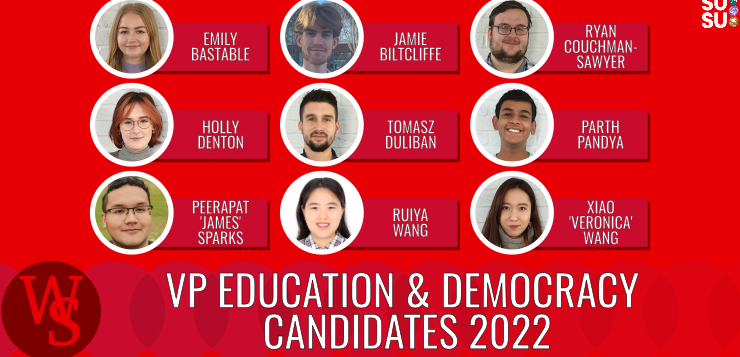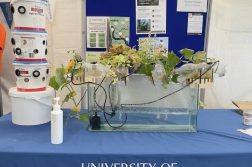- Interview with Zoe Chapple: VP Activities Candidate
- Interview with Rishi-Nayan Varodaria: Union President Candidate
- Interview with Parth Pandya: VP Education and Democracy Candidate
- Interview with Samuel Pegg: VP Activities Candidate
- Interview with Oliver Murray: Union President Candidate
- Interview with Xiao ‘Veronica’ Wang: VP Education and Democracy Candidate
- Interview with Benedict Madan: Union President Candidate
- RUMOUR HAS IT… 2022 UNION ELECTIONS RUMOURED SABBATICAL OFFICER CANDIDATES
- Interview with Jamie Biltcliffe: VP Education and Democracy Candidate
- Interview with Holly Denton: VP Education and Democracy Candidate
- Interview with Emily Bastable: VP Education and Democracy Candidate
- Spring Elections 2022 Candidates Revealed
- There’s still time to nominate yourself for a SUSU leadership role
- Interview with Harry Bull: Union President Candidate
- Interview with Ryan Couchman-Sawyer: VP Education and Democracy Candidate
- Interview with Selin Moustafa: VP Welfare and Community Candidate
- Interview with Ruby Turner: VP Welfare and Community Candidate
- Interview with Aycha Ates-Di Adamo: VP Welfare and Community Candidate
- Interview with VP Sports Candidate: Casie Osbourne
- Interview with Corin Holloway: VP Activities Candidate
- SUSU Spring Elections 2022 Liveblog
Wessex Scene were able to interview Emily Bastable about their campaign to be the next VP Education and Democracy.
Emily elected to answer these questions during an interview.
Why did you apply for the role of VP Education and Democracy?
It was such a mix of different things. It was the fact that I felt like I had unfinished business, that I had made progress this year with the Partnership for Education Reform which is a Partnership I created because I felt like there were things missing in the Education Undergraduate Programme. So, I’ve made good progress, but I feel like there’s still more to do and I feel like I want to bring the work that I’ve done just in my School, Education School, to the wider University. But also, just because it just seemed like a cool gig, like seeing what Lottie’s been able to do this year is really great and I think it’s given her such a different perspective on education, which her being an Education student as well I think is going to really help her in the next two years of her degree as well. And the third reason is just because I think I would be good at it.
If you got elected, what would be your top three areas of focus?
I want to reframe the way that we see student feedback. There are a couple of key players in the staff that see student feedback as a resource and I want to tap into that and basically explode it, if that makes sense. So, revamping the course representatives so they’re more like accountability people — you know programme leaders, they don’t know everything that’s going on, they don’t know what every member of staff is doing, so if your course representative is seen as somebody that, if you’ve got any concerns or any questions you go to them first, and then they can follow up with the staff members and that goes for whether it’s questions about an assessment type that you don’t think is very accessible to your needs or whether it’s, actually, you need to raise discriminatory behaviour, you know if something was said to you that was inappropriate and you want to raise it, there needs to be somebody that you can talk to. And I think the course representatives are great. So, yeah, that kind of change.
The other two key areas. Oh, gosh, the real student stories. It sounds like a flimsy thing, but it’s a video campaign, not just to inspire applicants from underrepresented backgrounds, but highlighting diversity is so important from a staff and student perspective, because coming from a place of ignorance is where you get areas of discrimination and stereotyping.
So, when you know your cohort, when you know who’s at Southampton and who you’re speaking to and the different backgrounds, you’re going to be able to teach a lot better to your cohort. So, I think that’s important.
Third area is activism. Training is very big. I want to empower students so that they can say, oh, I think this is wrong with my course. How would I go about kind of improving it, which is kind of like what I did with the partnership. So, I want to give other students that opportunity.
So what’s something that SUSU provides that you like, and what is something that you would like to change or alter?
So I do a lot of work with student ambassadorship, and one thing that’s been really receptive, especially with parents, is the SUSU lettings team. A lot of parents see that as a massive highlight that we have here at Southampton, because that’s a massive worry when you’re sending your child off to university — are they going to get screwed over by a landlord? And the SUSU lettings team are incredibly hardworking and that’s a massive plus.
I think something that we could work better at. Oh, gosh, I think we do a pretty decent job. I’ve spoken to other universities, like friends at other universities, and we have it good here. We really do. What would be good? Yeah, I think SUSU being more of a student hub and having more of a presence on other campuses, so it doesn’t just feel like it’s here. You either come here to this building, to this campus, or you’re completely cut off from everything that SUSU does. I think that it should be more of like a spider web kind of thing where you get kind of drawn in, but also there’s a place for you if you are on a different campus.
What do you identify as the current problems with the VP Education and Democracy role, and how would you aim to combat these?
I feel like no one understands what the role is. I think that’s a big thing. When talking to people about my campaign, people are like, okay, so what are you actually in charge of? So, I think that definitely needs to get cleared up a little bit, especially with autumn elections as well. People don’t know what course representatives do. They don’t know what Head of Faculties do. So, I think a bit more publicity about what the actual roles do and how it actually works and who do you go to for help, kind of thing? I think that would be something that I would try and change, either through social media or through drop-ins. I’d like to be someone that you can just tap on the shoulder and you can say, oh, I was thinking about this, can you help me? That kind of publicity, so people don’t feel afraid to just approach me.
How will you reassure students that their voices matter when the University chose to ignore the recent all-student vote?
I recently answered a question about this, and it’s currently in moderation. Ben raised this in a Senate meeting, about how he’s the only person on the University executive board, and so that makes his job increasingly difficult because he’s literally a minority voice. And I agree with him that there should probably be more student representation. And I would also advocate for the importance of student voice to staff, that although they work in higher education and they have a lot of expertise on what works and what doesn’t, and I respect that, you do need student experience. You cannot run a university without knowing what the student experience is. And I think highlighting the usefulness of knowing what students think and student’s ideas is incredibly important. And I would definitely advocate for staff to listen to their students more and realize the potential of actually listening and taking on board ideas.
In your manifesto, you list lots of educational causes. Are you comfortable campaigning for democratic ones as well?
I think the role kind of goes together. It’s going to sound like quite nerdy being an education student, but education needs diversity of opinion and of experience for you to actually be educated. You can’t consider yourself educated if you’re only educated from one perspective, you need everyone’s different stories, you need different perspectives, for you to get the best education possible. So, democracy absolutely feeds into that, because everybody needs to have fair representation for this to work. So, they completely go hand in hand. So, I understand that they’re education focused, but student voice and representation is intrinsic to quality education.
How do you think that creating and promoting a hashtag would improve the student experience?
Yeah, it does sound a bit flimsy. It does. No, I will totally like, you’ll be like, oh, one of her main policies is a video campaign. I think changing somebody’s perspective is the first step to change. You can’t have a quality conversation if you both have completely different ideas of what a Southampton student looks like. So, the campaign seems like, oh, it’s just a hashtag. It’s just going to be a video campaign. But if we’re able to change people’s perspectives and ideas of what a Southampton student looks like and diversify their view on what makes a good student or what a student university experience looks like, then we can actually start making steps to making education work for everybody. So, yeah, it’s the first step. And my campaign is a lot about doing the groundwork, because I only have a year and change is very slow, so it’s about getting the groundwork done so that if elected, the person who follows on behind me has somewhere to stand on. It’s like the Google Scholar thing. It’s like stand on the Shoulders of Giants. I think that’s, like, it’s so cliche, but, like, it’s true. You start from where the other person finished, and you make change from there.
In what way do you believe the University is ‘fractured’ and how would you seek to fix this?
I think it’s fractured in the sense that your experience differs so greatly depending on what program you are on. It also differs greatly in your own background. So, when you’re looking at awarding gaps, whether you have a disability, whether your socioeconomic household status, your ethnicity, mental health problems, all of that, that feeds into an awarding gap, it feeds into your educational experience. That means that not everybody is getting the same kind of access or quality. I think that needs to be changed.
It’s been shown that your belonging to an institution increases with the more opportunities you are given to participate and have a role in changing it. So, through student voice, belonging to Southampton will increase. So, it’s about bringing everybody in to democracy, to student voice, so that they feel that they are represented and they feel that they have a voice and that they’re heard.
Wessex Scene attempted to contact Peerapat ‘James’ Sparks, Ruiya Wang, or Tomasz Duliban but were unfortunately not able to set up an interview.




